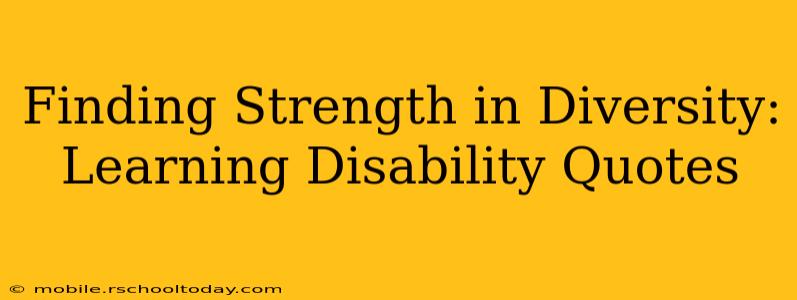Learning disabilities affect millions worldwide, impacting how individuals learn and process information. While challenges exist, the beauty of neurodiversity lies in the unique strengths and perspectives individuals with learning disabilities bring to the world. This article celebrates that diversity through inspiring quotes and explores common questions surrounding learning disabilities. We'll delve into the importance of understanding, acceptance, and support for those navigating the complexities of learning differently.
What are some common types of learning disabilities?
Learning disabilities manifest in various ways, impacting different aspects of learning. Some common types include:
- Dyslexia: Primarily affects reading and spelling abilities. Individuals with dyslexia may struggle with phonological processing (the sounds of language), decoding words, and reading fluency.
- Dysgraphia: Impacts writing abilities, making it challenging to form letters, write legibly, and organize written thoughts. Motor skills and spatial reasoning can also be affected.
- Dyscalculia: Affects mathematical abilities, impacting number sense, calculation, and problem-solving. Understanding mathematical concepts can be significantly more challenging.
- Auditory Processing Disorder (APD): Affects the brain's ability to process sounds, impacting comprehension of spoken language, following instructions, and distinguishing between similar-sounding words.
- Nonverbal Learning Disabilities (NVLD): Impact the ability to understand nonverbal cues, spatial relationships, and visual-motor skills. Social interactions and interpreting body language can be challenging.
These are just a few examples, and many individuals may experience a combination of learning disabilities, making their learning journey even more unique.
How can I support someone with a learning disability?
Supporting someone with a learning disability involves understanding, patience, and a willingness to adapt. Here are some key approaches:
- Educate yourself: Learn about the specific learning disability the individual faces. Understanding their challenges helps you provide appropriate support and avoid misunderstandings.
- Practice empathy and patience: Learning can be significantly more challenging for individuals with learning disabilities. Patience and understanding are crucial.
- Adapt communication: Use clear and concise language, breaking down complex instructions into smaller, manageable steps. Consider visual aids or different communication methods.
- Celebrate strengths: Focus on their abilities and accomplishments, boosting their confidence and self-esteem.
- Advocate for their needs: Help them access necessary resources and support systems, such as assistive technologies, tutoring, or specialized education programs.
Remember, everyone learns differently, and celebrating that diversity is key.
What are the strengths of people with learning disabilities?
Contrary to common misconceptions, individuals with learning disabilities possess a wealth of strengths. Their unique ways of thinking and processing information often lead to remarkable creativity, innovation, and resilience. Some common strengths include:
- Creativity and innovation: Different thinking processes can lead to unique solutions and perspectives.
- Strong visual thinking: Some individuals excel at visualizing and understanding information visually.
- Exceptional memory for specific details: Often possessing remarkable memory for specific details, facts, or patterns.
- Resilience and perseverance: Overcoming challenges related to their learning disability builds significant resilience.
- Strong interpersonal skills: Many develop exceptional empathy and communication skills, fostering deep connections with others.
What are some inspiring quotes about learning disabilities?
Several inspiring quotes highlight the strength and resilience of individuals with learning disabilities. These quotes serve as reminders of their unique abilities and contributions to society. (Note: Specific quotes will vary depending on available resources, but the focus will be on positive and empowering messages celebrating neurodiversity.)
- "The only disability in life is a bad attitude." -- This quote emphasizes the importance of a positive mindset in overcoming challenges. It applies broadly but resonates deeply within the context of learning disabilities.
- "It's not about fixing the student, it's about fixing the system." -- This highlights the need for inclusive and adaptive educational systems rather than expecting individuals to conform to a rigid standard.
- "Neurodiversity is not a deficit, it's a difference." -- This quote encapsulates the core principle of celebrating the inherent value of diverse learning styles and neurological profiles.
- (Insert other relevant and inspiring quotes focusing on perseverance, strength, and the unique talents of individuals with learning disabilities.)
How can I help my child who has a learning disability succeed?
Supporting a child with a learning disability requires a multi-pronged approach involving collaboration between parents, educators, and healthcare professionals. Key steps include:
- Early identification and intervention: Early diagnosis allows for timely intervention, maximizing the child's potential.
- Individualized education program (IEP): Working closely with the school to develop an IEP tailored to the child's specific needs.
- Assistive technologies and support services: Accessing appropriate resources, like tutoring, assistive technology, or specialized therapy.
- Building self-esteem and confidence: Emphasizing strengths and celebrating accomplishments to foster self-belief.
- Creating a supportive home environment: Providing a structured, supportive, and understanding home environment.
Finding strength in diversity means embracing the unique talents and perspectives of all individuals, including those with learning disabilities. By fostering understanding, providing support, and celebrating neurodiversity, we can create a more inclusive and equitable world where everyone can thrive.
